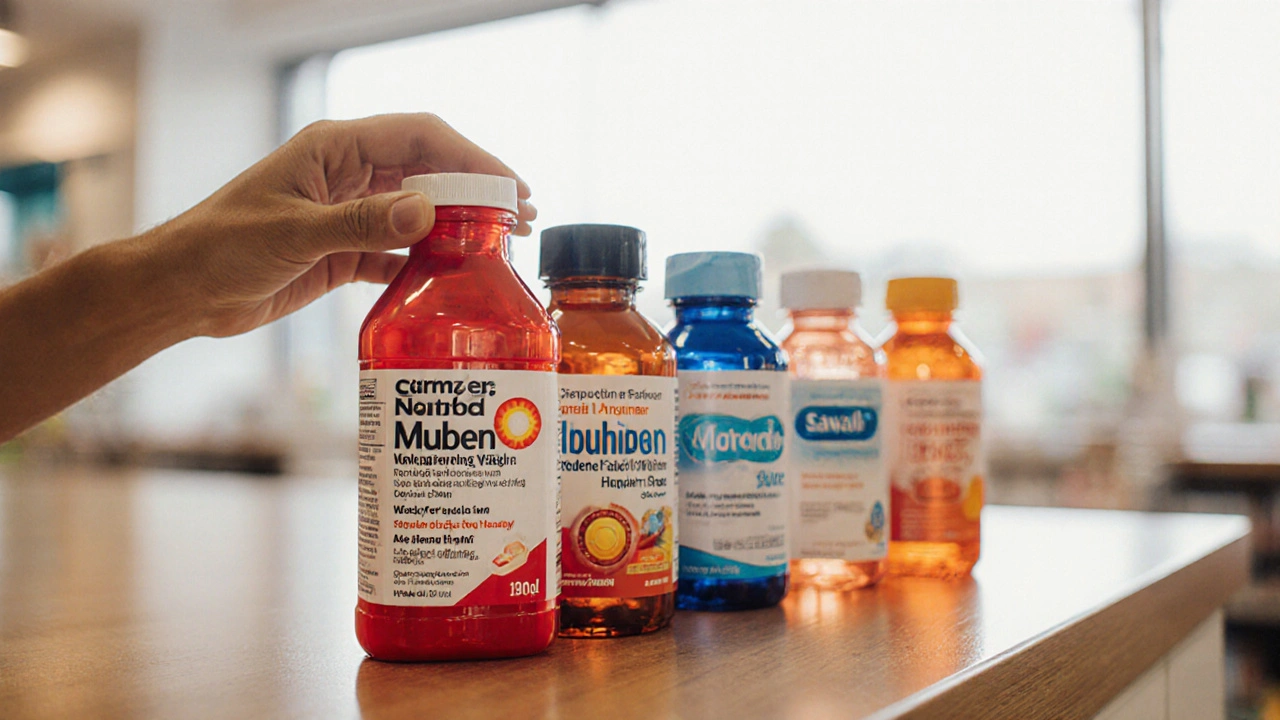Painkiller Selector
Select Your Symptoms
Recommended Painkiller:
Reason:
Quick Take
- Ibuprofen (Nurofen) is a non‑steroidal anti‑inflammatory drug (NSAID) that works best for inflammation‑driven pain.
- Acetaminophen (Paracetamol) is gentler on the stomach but lacks anti‑inflammatory power.
- Aspirin offers cardio‑protective benefits but can irritate the gut.
- Naproxen provides a longer‑lasting effect, great for chronic aches.
- For short‑term, mild pain, Nurofen often hits the sweet spot of speed and strength.
When you reach for a painkiller, you’re really choosing a chemistry recipe that fits your symptom, health profile, and budget. This guide breaks down Nurofen (the most popular ibuprofen brand) and lines it up against five common over‑the‑counter alternatives. By the end you’ll know which tablet to pop for a headache, a sore muscle, or that post‑workout sting.
What is Nurofen?
Nurofen is a brand of ibuprofen tablets sold without a prescription in most countries. Ibuprofen belongs to the non‑steroidal anti‑inflammatory drug (NSAID) family, meaning it blocks the COX enzymes that produce prostaglandins - the chemicals that trigger pain, fever, and swelling.
Typical adult dose: 200‑400mg every 4‑6hours, not exceeding 1,200mg daily without medical supervision. Onset of relief is usually felt within 30‑45minutes, and the effect lasts around 6‑8hours.
Common Over‑the‑Counter Alternatives
Below are the most frequently mentioned competitors, each with its own active ingredient and safety profile.
- Acetaminophen (also known as Paracetamol) - a pain reliever and fever reducer that works centrally in the brain rather than on inflammation.
- Aspirin - an NSAID that also irreversibly inhibits platelet aggregation, giving it a cardioprotective edge.
- Naproxen - a longer‑acting NSAID often marketed under the name Aleve.
- Diclofenac - an NSAID available as a topical gel (Voltaren) and as oral tablets in some markets.
- Celecoxib - a prescription‑only COX‑2‑selective NSAID (brand name Celebrex) that minimizes stomach irritation but can affect heart health.
Side‑by‑Side Comparison
| Active Ingredient | Typical Dose | Onset (min) | Duration (hrs) | Best For | Common Side Effects | Price (USD, per pack) |
|---|---|---|---|---|---|---|
| Ibuprofen (Nurofen) | 200‑400mg q4‑6h (max 1,200mg) | 30‑45 | 6‑8 | Inflammatory pain, dental pain, menstrual cramps | Stomach upset, mild rash | $4‑7 |
| Acetaminophen (Paracetamol) | 500‑1,000mg q4‑6h (max 3,000mg) | 45‑60 | 4‑6 | Headache, fever, mild musculoskeletal pain | Liver toxicity at high doses | $3‑5 |
| Aspirin | 325‑650mg q4‑6h (max 4g) | 30‑60 | 4‑6 | Heart‑related pain, low‑grade fever | Stomach bleeding, tinnitus | $2‑4 |
| Naproxen | 220‑440mg q8‑12h (max 660mg) | 30‑60 | 8‑12 | Chronic arthritis, back pain | GI upset, dizziness | $5‑8 |
| Diclofenac (topical gel) | Apply 2‑4g to affected area 3‑4×/day | 15‑30 (local) | 6‑8 (local) | Joint pain, sports injuries | Skin irritation, rare systemic effects | $6‑10 |

How to Choose the Right Over‑the‑Counter Painkiller
Consider these decision points before you grab the next bottle off the shelf:
- Nature of pain: Is inflammation a major factor? If yes, an NSAID like ibuprofen or naproxen usually outperforms acetaminophen.
- Stomach health: History of ulcers or gastritis? Acetaminophen or a topical diclofenac can spare the gut.
- Cardiovascular risk: Aspirin may help low‑dose users, but high‑dose NSAIDs can raise blood pressure.
- Duration needed: For all‑day relief, naproxen’s 12‑hour window reduces dosing frequency.
- Age & weight: Children under 12 should avoid ibuprofen doses meant for adults; acetaminophen has pediatric formulations.
- Drug interactions: If you’re on blood thinners, avoid aspirin and high‑dose ibuprofen unless your doctor says otherwise.
Pros and Cons at a Glance
| Product | Pros | Cons |
|---|---|---|
| Nurofen (Ibuprofen) | Fast onset, strong anti‑inflammatory, widely available. | Potential stomach irritation, not safe for late‑pregnancy. |
| Acetaminophen | Gentle on stomach, safe for most ages. | No anti‑inflammatory effect, liver toxicity risk. |
| Aspirin | Cardio‑protective at low doses, cheap. | Bleeding risk, strong GI side effects. |
| Naproxen | Long‑lasting, good for chronic pain. | Higher GI risk than ibuprofen, slower onset for some users. |
| Diclofenac Gel | Targets pain locally, minimal systemic exposure. | Only works for surface‑level issues, may cause skin rash. |
Safety Tips & Common Interactions
Even over‑the‑counter meds can clash with prescriptions. Keep these warnings in mind:
- Never combine two NSAIDs (e.g., ibuprofen + naproxen) - you’ll amplify stomach risk.
- Alcohol plus acetaminophen spikes liver damage chances.
- People on anticoagulants (warfarin, apixaban) should avoid high‑dose aspirin and ibuprofen without a doctor’s go‑ahead.
- Pregnant women in the third trimester should steer clear of NSAIDs; acetaminophen is the safer choice.
When to See a Healthcare Professional
If pain persists beyond three days, spikes to severe levels, or is accompanied by fever, rash, or unexplained weight loss, book an appointment. Chronic use of any NSAID should be reviewed annually to guard against hidden kidney or heart issues.
Frequently Asked Questions
Can I take Nurofen and Acetaminophen together?
Yes, the combo is sometimes recommended for severe pain because ibuprofen tackles inflammation while acetaminophen handles fever. Keep to the lowest effective doses and avoid exceeding daily limits for either.
Is Nurofen safe for children?
Children can use ibuprofen, but only in pediatric formulations with weight‑based dosing. Never give an adult Nurofen tablet to a child without consulting a pediatrician.
Why does aspirin cause stomach bleed?
Aspirin irreversibly blocks COX‑1, which also protects the stomach lining. Without that protection, gastric acid can erode the mucosa, leading to ulcers or bleeding.
Which OTC painkiller lasts the longest?
Naproxen typically provides 8‑12 hours of relief, making it the longest‑acting non‑prescription option.
Can I use diclofenac gel on my knee instead of pills?
For localized joint pain, the gel can be effective and avoids systemic side effects. However, if the pain is deep‑seated or accompanied by swelling, oral NSAIDs might work better.

Next Steps
1. Identify the main driver of your pain - inflammation, fever, or simple ache.
2. Match that driver to the table above - choose ibuprofen for swelling, acetaminophen for fever, naproxen for all‑day relief.
3. Check your personal health factors (stomach, heart, liver, pregnancy).
4. Purchase the appropriate OTC product and follow the dosage chart.
5. Monitor for side effects; if anything feels off, stop and contact a pharmacist or doctor.
Armed with this comparison, you can pick the right tablet without guesswork and stay on track toward a pain‑free day.


Mayra Oto
If you’re weighing Nurofen against other over‑the‑counter options, the biggest factor is the pain’s underlying cause. Inflammation‑driven aches, like a sprained ankle, respond best to ibuprofen because it tackles the prostaglandin pathway. For simple headaches or fever, acetaminophen is gentler on the stomach and works just as fast. Keep an eye on your personal health profile-stomach sensitivity, heart risk, and any current meds-before you decide.